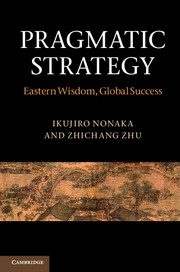9 - Pragmatism East and West
Published online by Cambridge University Press: 05 June 2012
Summary
In previous chapters we drew mainly on Confucianism. As readers may have already noted, we have also been incorporating what we consider useful from the traditions and practices of other people, East and West, South and North. This is inspired by pragmatism: bricolage making-do, we need to enlarge our resource pool. Meanwhile, whatever we learn from others, we need to adapt to local circumstances. To achieve this, it is imperative to heighten our sensitivity towards the differences between traditions.
Hence, undertaking a pragmatic turn, it is useful to appreciate what the similarities and differences are, how different pragmatist traditions can learn from each other, and, most importantly, how they can inform strategic actions of today. A thousand-mile journey begins with a small step (千里之行始于足下), as a Confucian proverb goes. Taking such a step in this chapter, we will explore the key intellectual sources that inform current pragmatic thinking and practices in ‘the East’ and ‘the West’.
By ‘examining traditions’, we do not mean digging up ancient canons on oracles or bamboo slips to discover their ‘genuine meaning’. We do not claim such meaning. There can be no ‘objective reading’ of Confucius, Dewey or Aristotle; there is always a ‘distance’ between our current concerns and those of past thinkers. Neither do we regard ‘authorial’ Confucian or Deweyan or Aristotelian teachings as ideal states to be emulated; there is no sense, no hope, no way in returning to the past. Rather, we will analyse contemporary interpretations of Confucian, Deweyan and Aristotelian wisdom. As John Dewey suggested, past doctrines require reconstruction in order to remain useful for solving present problems. Talking about Marx, Richard Rorty posited: ‘the question is not who the real Marx was but which Marx is relevant for today.’ We agree.
- Type
- Chapter
- Information
- Pragmatic StrategyEastern Wisdom, Global Success, pp. 370 - 409Publisher: Cambridge University PressPrint publication year: 2012



